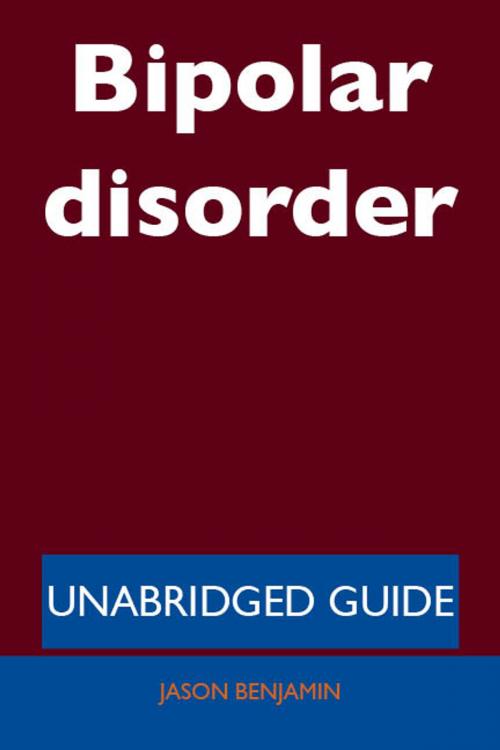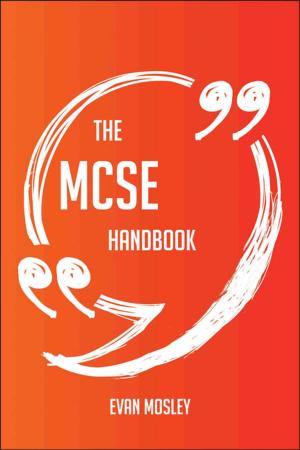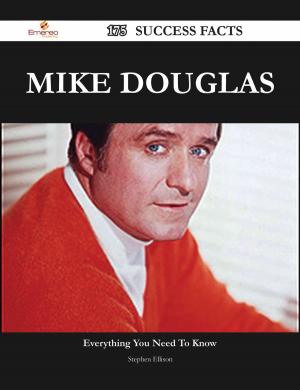Bipolar disorder - Unabridged Guide
Nonfiction, Reference & Language, Reference, Social & Cultural Studies, Social Science| Author: | Jason Benjamin | ISBN: | 9781486429233 |
| Publisher: | Emereo Publishing | Publication: | October 24, 2012 |
| Imprint: | Emereo Publishing | Language: | English |
| Author: | Jason Benjamin |
| ISBN: | 9781486429233 |
| Publisher: | Emereo Publishing |
| Publication: | October 24, 2012 |
| Imprint: | Emereo Publishing |
| Language: | English |
Here's part of the content - you would like to know it all? Delve into this book today!..... : Individuals who experience manic episodes also commonly experience depressive episodes, or symptoms, or a mixed state in which features of both mania and depression are present at the same time.
... To be diagnosed with mania according to the Diagnostic and Statistical Manual of Mental Disorders (DSM), a person must experience this state of elevated or irritable mood, as well as other symptoms, for at least one week, less if hospitalization is required.
...Hypomanic episodes do not go to the full extremes of mania (i. e. , do not usually cause severe social or occupational impairment, and are without psychosis), and this can make bipolar II more difficult to diagnose, since the hypomanic episodes may simply appear as a period of successful high productivity and is reported less frequently than a distressing, crippling depression.
...There is evidence that it becomes less prevalent with age but nevertheless accounts for a similar percentage of psychiatric admissions; that older bipolar patients had first experienced symptoms at a later age; that later onset of mania is associated with more neurologic impairment; that substance abuse is considerably less common in older groups; and that there is probably a greater degree of variation in presentation and course, for instance individuals may develop new-onset mania associated with vascular changes, or become manic only after recurrent depressive episodes, or may have been diagnosed with bipolar disorder at an early age and still meet criteria.
There is absolutely nothing that isn't thoroughly covered in the book. It is straightforward, and does an excellent job of explaining all about Bipolar disorder in key topics and material. There is no reason to invest in any other materials to learn about Bipolar disorder. You'll understand it all.
Inside the Guide: Bipolar disorder, Jean-Pierre Falret, Irritability, Involuntary commitment, Interpersonal and social rhythm therapy, Intermittent explosive disorder, Insomnia, Insanity, ICD-10 Chapter V: Mental and behavioural disorders, Hypothyroidism, Hypomania, Hypersomnia, Hypersexuality, History of bipolar disorder, Hallucination, Gabapentin, Fugue state, Frederick K. Goodwin, Family therapy, Executive functions, Euphoria, Emotional dysregulation, Emil Kraepelin, Electroconvulsive therapy, Eating disorder, EastEnders, Dysthymia, Dysphoria, Dopamine, Dissociative identity disorder, Diagnostic and Statistical Manual of Mental Disorders, Depression (mood), Depersonalization, Delusional disorder, Delusion, Delirium, Cyclothymia, Creativity, Cognitive behavioral therapy, Classification of mental disorders, Circadian rhythm, Chris Joseph (autobiographer), Catatonia, Carbamazepine, Borderline personality disorder, Body dysmorphic disorder, Bipolar spectrum diagnostic scale, Bipolar spectrum, Bipolar disorders research, Bipolar disorder in children, Bipolar I disorder, Bipolar II disorder, Autism spectrum, Atypical antipsychotic, Attention deficit hyperactivity disorder, Associated features of bipolar disorder, Asperger syndrome, Antipsychotic, Anticonvulsant, Anorexia nervosa, Anhedonia, Amygdala, Altman Self-Rating Mania Scale, Affective spectrum, 90210 (TV series)
Here's part of the content - you would like to know it all? Delve into this book today!..... : Individuals who experience manic episodes also commonly experience depressive episodes, or symptoms, or a mixed state in which features of both mania and depression are present at the same time.
... To be diagnosed with mania according to the Diagnostic and Statistical Manual of Mental Disorders (DSM), a person must experience this state of elevated or irritable mood, as well as other symptoms, for at least one week, less if hospitalization is required.
...Hypomanic episodes do not go to the full extremes of mania (i. e. , do not usually cause severe social or occupational impairment, and are without psychosis), and this can make bipolar II more difficult to diagnose, since the hypomanic episodes may simply appear as a period of successful high productivity and is reported less frequently than a distressing, crippling depression.
...There is evidence that it becomes less prevalent with age but nevertheless accounts for a similar percentage of psychiatric admissions; that older bipolar patients had first experienced symptoms at a later age; that later onset of mania is associated with more neurologic impairment; that substance abuse is considerably less common in older groups; and that there is probably a greater degree of variation in presentation and course, for instance individuals may develop new-onset mania associated with vascular changes, or become manic only after recurrent depressive episodes, or may have been diagnosed with bipolar disorder at an early age and still meet criteria.
There is absolutely nothing that isn't thoroughly covered in the book. It is straightforward, and does an excellent job of explaining all about Bipolar disorder in key topics and material. There is no reason to invest in any other materials to learn about Bipolar disorder. You'll understand it all.
Inside the Guide: Bipolar disorder, Jean-Pierre Falret, Irritability, Involuntary commitment, Interpersonal and social rhythm therapy, Intermittent explosive disorder, Insomnia, Insanity, ICD-10 Chapter V: Mental and behavioural disorders, Hypothyroidism, Hypomania, Hypersomnia, Hypersexuality, History of bipolar disorder, Hallucination, Gabapentin, Fugue state, Frederick K. Goodwin, Family therapy, Executive functions, Euphoria, Emotional dysregulation, Emil Kraepelin, Electroconvulsive therapy, Eating disorder, EastEnders, Dysthymia, Dysphoria, Dopamine, Dissociative identity disorder, Diagnostic and Statistical Manual of Mental Disorders, Depression (mood), Depersonalization, Delusional disorder, Delusion, Delirium, Cyclothymia, Creativity, Cognitive behavioral therapy, Classification of mental disorders, Circadian rhythm, Chris Joseph (autobiographer), Catatonia, Carbamazepine, Borderline personality disorder, Body dysmorphic disorder, Bipolar spectrum diagnostic scale, Bipolar spectrum, Bipolar disorders research, Bipolar disorder in children, Bipolar I disorder, Bipolar II disorder, Autism spectrum, Atypical antipsychotic, Attention deficit hyperactivity disorder, Associated features of bipolar disorder, Asperger syndrome, Antipsychotic, Anticonvulsant, Anorexia nervosa, Anhedonia, Amygdala, Altman Self-Rating Mania Scale, Affective spectrum, 90210 (TV series)















